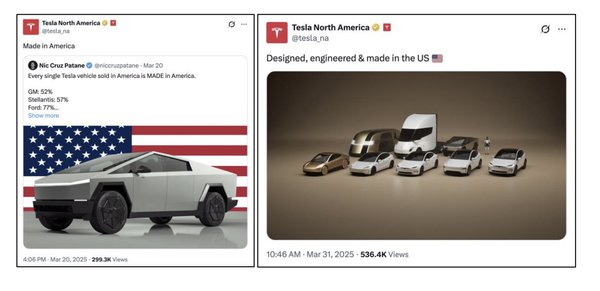
Truth In Advertising is once again going after
Tesla for its “Made in USA” claims.
In a letter sent Monday to Tesla’s general counsel, the watchdog group alleges that Tesla continues to make unqualified claims
in social media promotional posts, citing a number of deceptive posts made by the company on X in the last two months.
“As Tesla is aware, the Federal Trade Commission
requires that products marketed as made in America be ‘all or virtually all’ made domestically and contain ‘no -- or negligible -- foreign content,’” according to the
letter. “Tesla vehicles, however, are assembled in the U.S. with as much as 25% of the vehicles’ content coming from Mexico and other countries.”
As such,
Tesla’s USA-made claims are deceptive and in violation of FTC rules, the group alleges.
advertisement
advertisement
“While Tesla has every right to boast of its assembly work in the United States
and may be making efforts to bring more of its manufacturing work here, until and unless it has met the ‘all or virtually all’ standard, it must refrain from making unqualified U.S.-origin
claims,” according to the letter. “Such deception is especially harmful when, as here, it is disseminated during a particularly vulnerable time for U.S. consumers shopping for cars. We
trust Tesla will take immediate action to rectify this deceptive marketing.”
Tesla is just the latest car company whose "Made in USA" claims TINA.org has investigated
following the White House’s announcement that it would be imposing a 25% tariff on imported vehicles and certain car parts. Stellantis, the parent company of Jeep, Ram and Dodge quickly tweaked its Made in USA ads after receiving a letter from TINA.org.
“The bottom line: A truly 'Made in USA' car -- meaning one that meets the FTC’s ‘all or virtually all’ standard -- doesn’t exist,” according to Truth
in Advertising. “While automakers have every right to boast about their assembly plants in the U.S. that create American jobs and strengthen the U.S. economy, they cannot illegally embellish the
amount of manufacturing that takes place domestically.”
In a recent letter to the federal agency responsible for developing and implementing U.S. international trade policy,
Tesla acknowledged what many car companies have seemed reluctant to admit.
The automaker noted in its March 11 letter to the Office of the United States Trade Representative that “even with
aggressive localization of the supply chain, certain parts and components are difficult or impossible to source within the United States.”
Tesla today reported a 20% drop in auto revenue
as its first-quarter results miss Wall Street estimates. Net income dropped 71% to $409 million, or 12 cents a share, from $1.39 billion or 41 cents a year ago.
While the White
House’s recent announcement that it will impose a 25% tariff on imports of cars and certain car parts has sparked widespread concern over rising prices, the reasoning behind the plan
appears simple: to prompt U.S. consumers to buy American-made cars.
And given how much “Made in America” automotive marketing has existed over the years across numerous
brands, it may seem like there’s an abundance of options for buying American-made cars. The problem, however, is that those ads haven’t been telling you the truth. In fact, every single
car – even those marketed as made in the USA – contains imported parts.
According to the FTC, in order to advertise a product as made (or built or manufactured) in America, it must be “all or
virtually all” made in the United States, with “no—or negligible—foreign content.” And currently, there is no car on the planet that meets this definition.
Ford is one company that seems to have learned to toe the line with its claims.
The automaker recently aired a new commercial asserting that Ford is the automaker that not only employs the most hourly
workers in the country, but also the automaker that assembles the most vehicles in the U.S. What’s not in the ad? Any misleading or deceptive reference to being built or made in America,
according to Truth in Advertising.